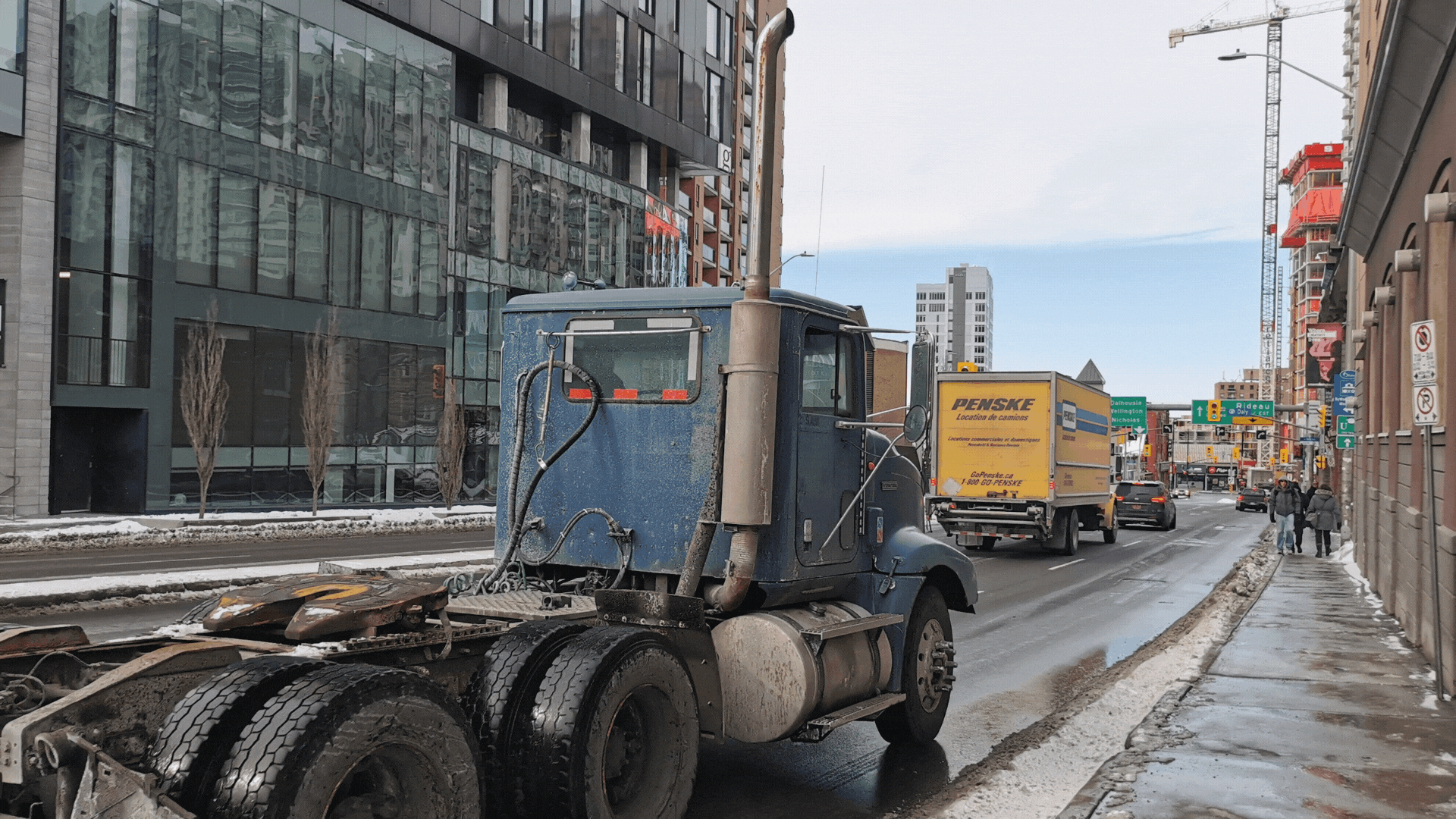Group files complaint alleging trucking corridor hazardous to health
OTTAWA/TRADITIONAL, UNCEDED TERRITORY OF THE ALGONQUIN ANISHNAABEG PEOPLE – A group of Ontario physicians is calling for an investigation into a major interprovincial trucking corridor through downtown Ottawa, citing concerns about air pollution and its impact on public health.
The Canadian Association of Physicians for the Environment (CAPE) – Ontario Committee, represented by Ecojustice, filed a complaint today under Ontario’s Health Protection and Promotion Act (HPPA), calling for an investigation into the health harms posed by the trucking corridor. Section 11 of the HPPA allows anyone to bring a health hazard to the attention of the Medical Officer of Health, at which point there is a mandatory duty to investigate.
Air pollution is recognized globally as a major health risk. In Canada, about 15,000 people die prematurely from air pollution every year, with approximately 6,600 deaths in Ontario alone.
Traffic-related air pollution near roadways is known to cause serious health damage, including asthma, cardiovascular disease, reduced lung function, impaired lung development in children, pre-term and low-birthweight infants, childhood leukemia, and premature death. For pollution from vehicle emissions, large diesel trucks are the worst offenders and older large trucks are the worst of the worst.
Air pollution levels in areas along the trucking corridor far exceed the levels recommended by the World Health Organization. Research conducted by Sierra Club of Canada and Ecology Ottawa in their “Breathe Easy” project, found air quality along the route was unhealthy, exceeding both national and international standards.
Dr. Mili Roy, Regional Director, Canadian Association of Physicians for the Environment – Ontario Committee, said:
“It is critical and long overdue to re-direct polluting heavy trucks off the streets of downtown Ottawa as a matter of public health and equity. Approximately 6,600 Ontarians die prematurely every year due to air pollution, much of it produced by vehicles, worsening multiple diseases ranging from asthma, heart attacks and dementia to diabetes, pregnancy-related diseases and multiple cancers. The majority of these impacts fall on our most vulnerable and socioeconomically disadvantaged persons.”
Dr. Eugenie Waters, Family Physician in Ottawa and CAPE Ontario member, said:
“Working as a Family Physician in Ottawa for over 10 years, I am appalled that the health of people who live, work and spend time outdoors near the downtown truck corridor, including some of the most highly vulnerable people in our city, continues to be put at such great risk. We know the health consequences of traffic-related air pollution and especially diesel emissions are serious, and lead to premature deaths, including from lung cancer, trigger increased hospital admissions and ER visits for asthma and COPD exacerbations. It’s time for solutions to be implemented that clear the air and protect health.”
Dr. Sehjal Bhargava, Public Health and Preventative Medicine and Family Medicine Resident at the University of Ottawa, said:
“So much of our health is determined by the environment. As a family medicine resident physician living and working in downtown Ottawa, I am extremely concerned by the near-constant exposure to diesel exhaust that people who live and work close to the downtown truck corridor experience daily.
“Enacting policies that prioritize health and air quality such as effectively monitoring toxics exposures and limiting truck traffic in times of dangerously low air quality can provide immediate benefits to health. Benefits include reducing rates of cancer, lung diseases, and premature deaths, as well as decreasing the burden of air pollution-related presentations to our healthcare system. Political and systemic action is necessary to protect the health of everyone, including some of Ottawa’s most vulnerable people. We can only be as healthy as our environment.”
Lynda Collins, lawyer with the Ecojustice Environmental Law Clinic at the University of Ottawa, said:
“Ottawa’s approach to managing heavy truck traffic is both unsustainable and unlawful. By allowing heavy trucks to be routed through the downtown core, and disproportionately impact vulnerable communities, the City of Ottawa is in violation of the Ontario Human Rights Code and the Charter-protected right to life, security of the person and equality.”
History of downtown trucking corridor
Heavy truck pollution in Ottawa’s downtown core has been an ongoing issue since the construction of the Macdonald-Cartier bridge in 1967. King Edward Avenue, Rideau, Waller, and Nicholas streets (KERWN) form a major interprovincial truck route, serving as the primary connection between freeway systems in Ontario (417) and Quebec (5/50).
The City of Ottawa’s traffic by-law directs heavy truck traffic through its downtown core, through a densely populated neighbourhood that is home to thousands of residents, hundreds of local businesses, a daycare centre with an outdoor play area just metres from the roadway, social housing, and three homeless shelters where people congregate at street level for hours every day (resulting in prolonged exposure to truck pollution).
Over the past five decades, multiple different attempts at solving the problem have been tried and failed to yield results. This latest complaint follows an open letter, sent by Ecojustice on behalf of CAPE and Friends of the Earth Canada, to Ottawa Mayor Mark Sutcliffe demanding that he take immediate action to clean up air quality in the City’s downtown core.

